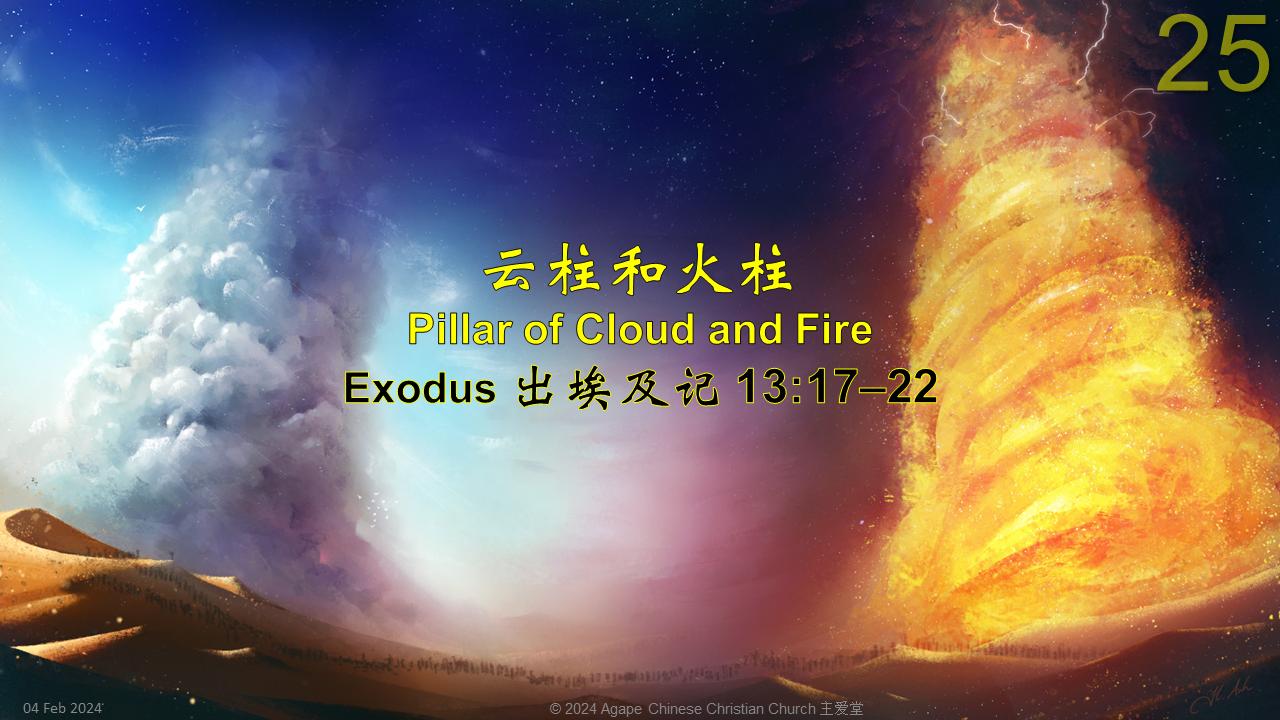云柱和火柱 Pillar of Cloud and Fire
The featured image is from https://max9210.artstation.com/
Remember these points
I put these points at the top of my sermon-prep template to remind myself every week:
- Show that main point of passage relates to Jesus and his saving work
- (1 Cor 1:18) A truly gospel-centred message will not be acceptable in a synagogue or mosque
- Did I proclaim the gospel as the headline news of the sermon, rather than as a “by the way…”?
- Unbelievers are called to repent, believe, and be saved
- Believers are encouraged to abandon their old self, renew their minds, put on the new self in Christ
- Preach simple sermons, so that God’s people can see Christ more clearly and love him more dearly
News
Chinese new year this Saturday (10 Feb).
Next Sunday we have New Year pot-luck!
Hook
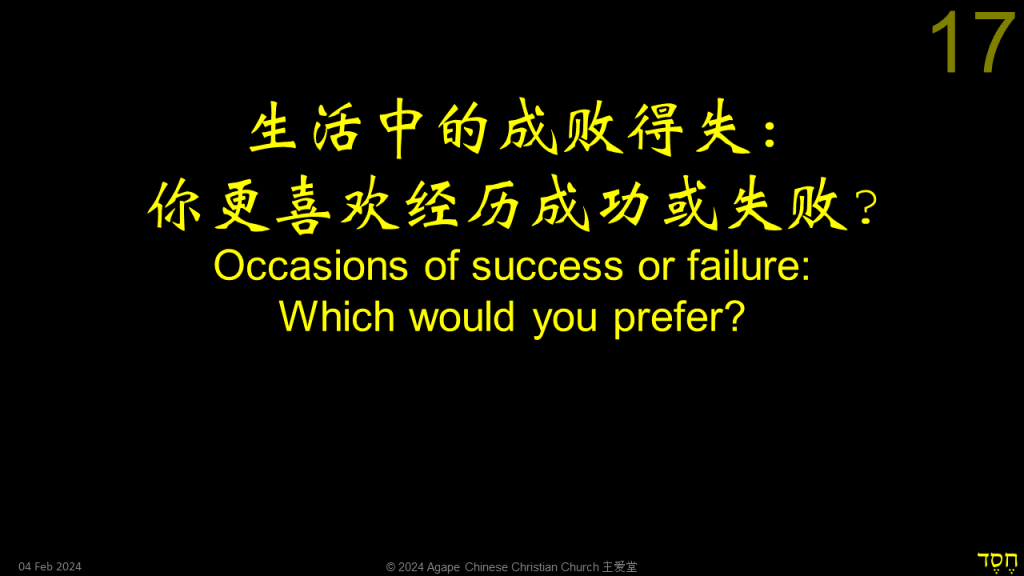
成败得失 Chéngbài déshī Expression meaning success or failure.
成 from 成功 Chénggōng Success
败 from 失败 shībài Failure
得 from 得到 dédào To get something, to obtain something
失 from 失去 shīqù, to lose something
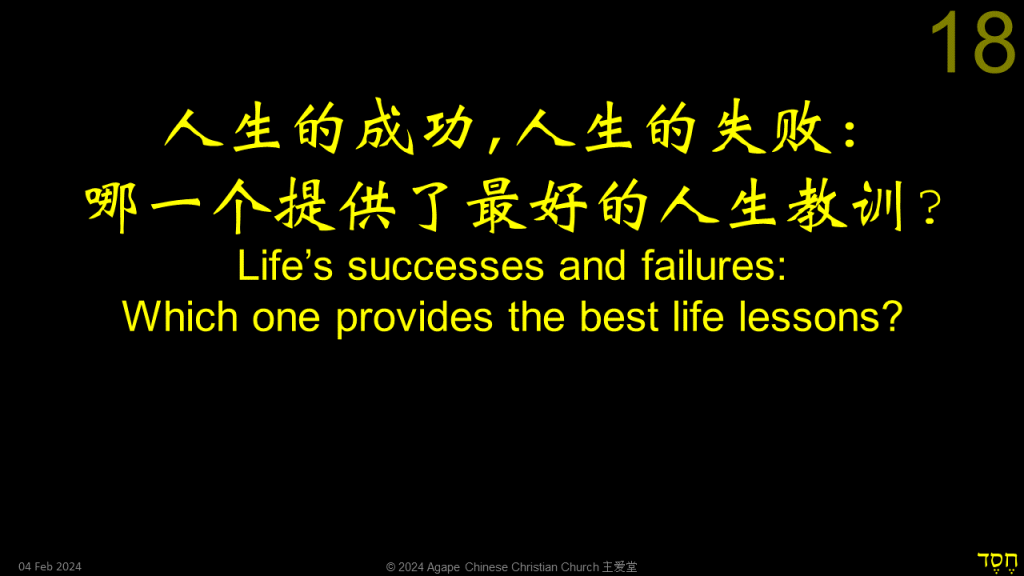
Life’s successes and failures, which provides the best life lessons?
- All of us have occasions of success or failures in life.
- Successes: good mark on an exam, a promotion at work, he/she whom you like is willing to spend time with you, etc.
- Failures: Making a bad decision, losing your job, getting cancer, etc.
- We can learn from both successes and failures, they both provide valuable lessons for our lives.
- Most people would prefer successes in life, but at the same time, most would agree that occasions of failure are what enable us to grow and mature in life.
- The Israelites will learn many lessons as they finally leave Egypt (after 430 years), and most of these lessons are from their failures.
- God took them round the long way into Canaan. Why?
- Maybe to let them learn and mature from hardship and failure.
- Maybe to let them learn to depend on God and not on their apparent successes.
We can all learn the same lessons.
Passage
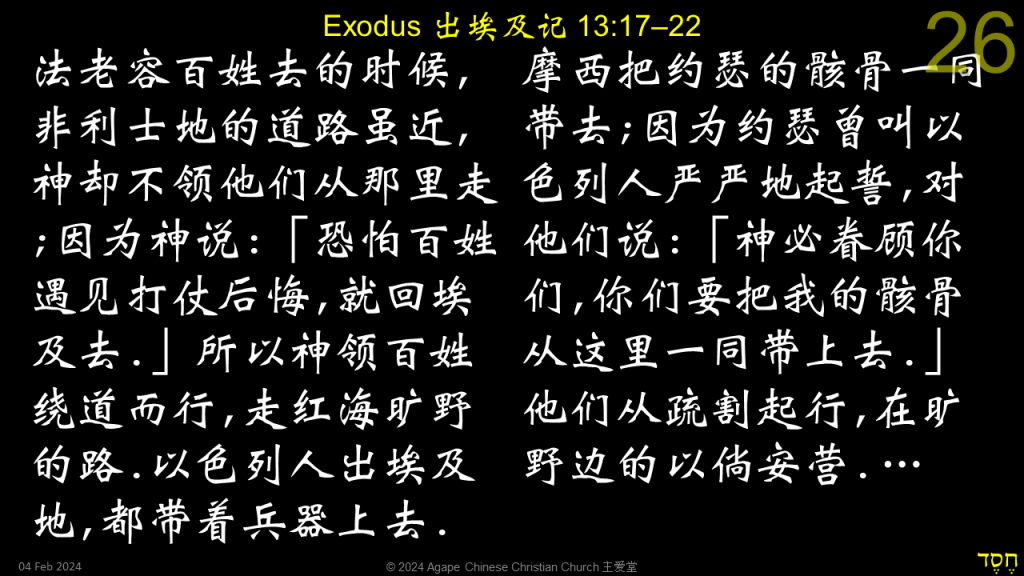
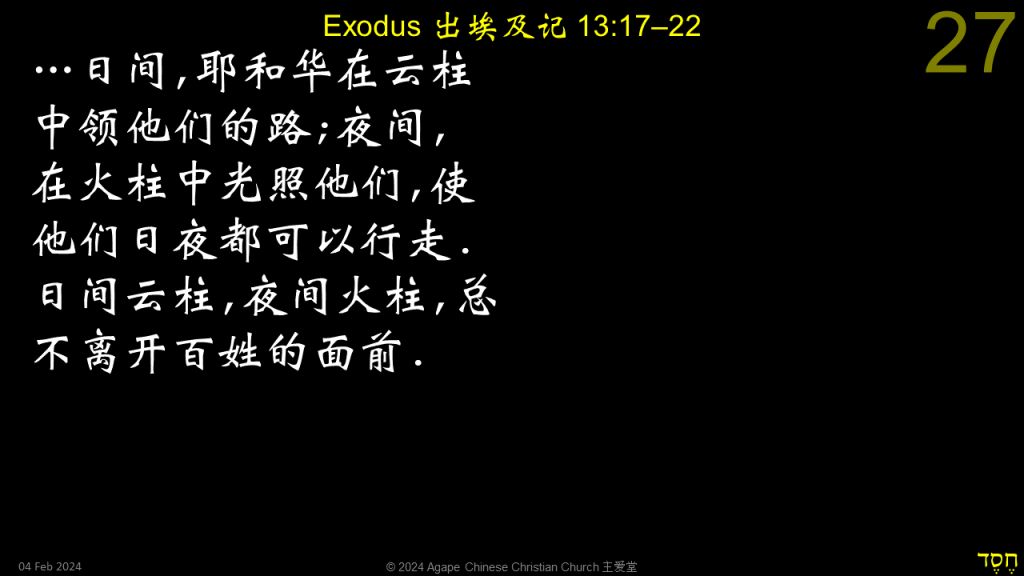
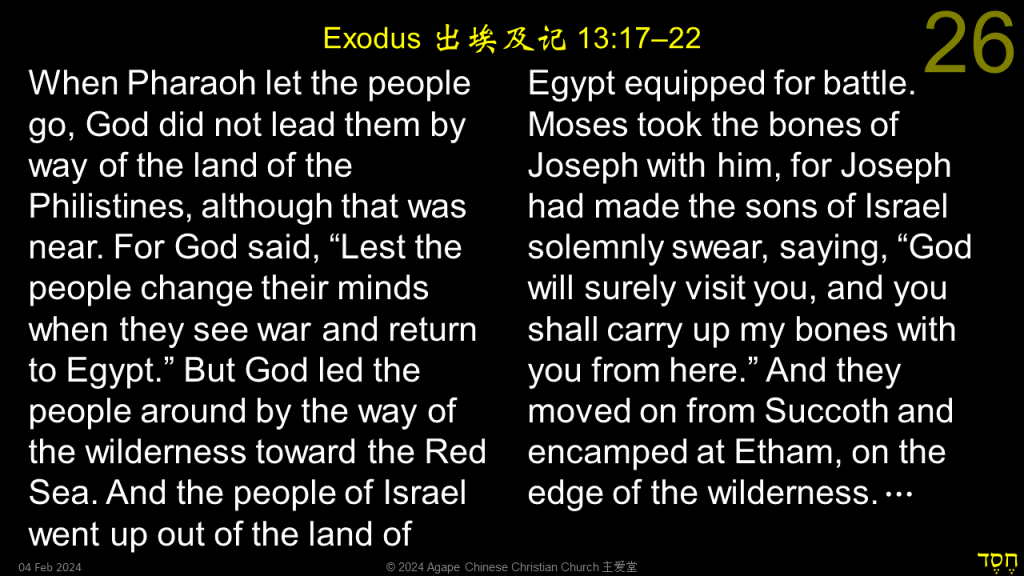

Outline
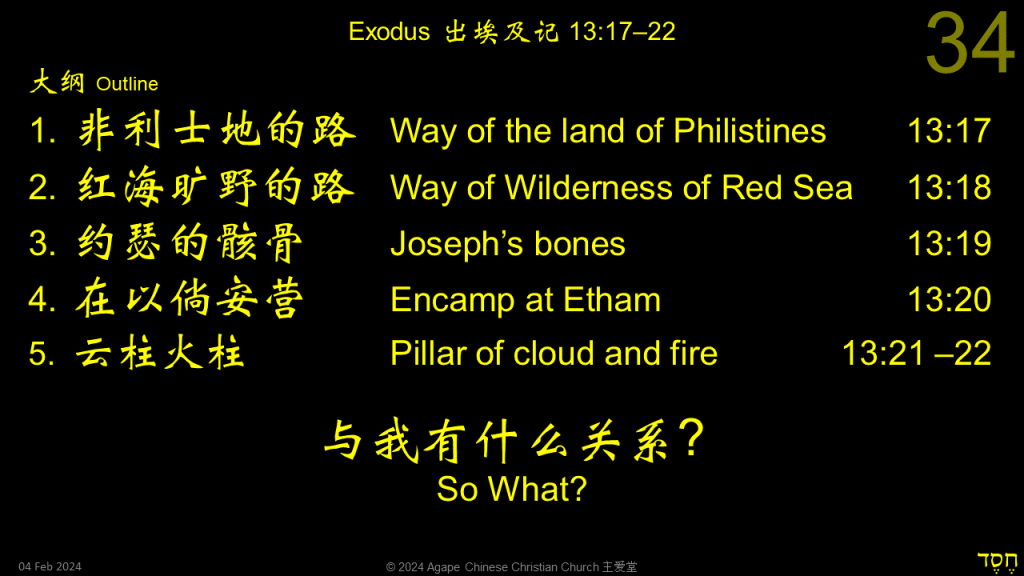
Section 1 非利士地的路 Way of the land of Philistines Exo 13:17
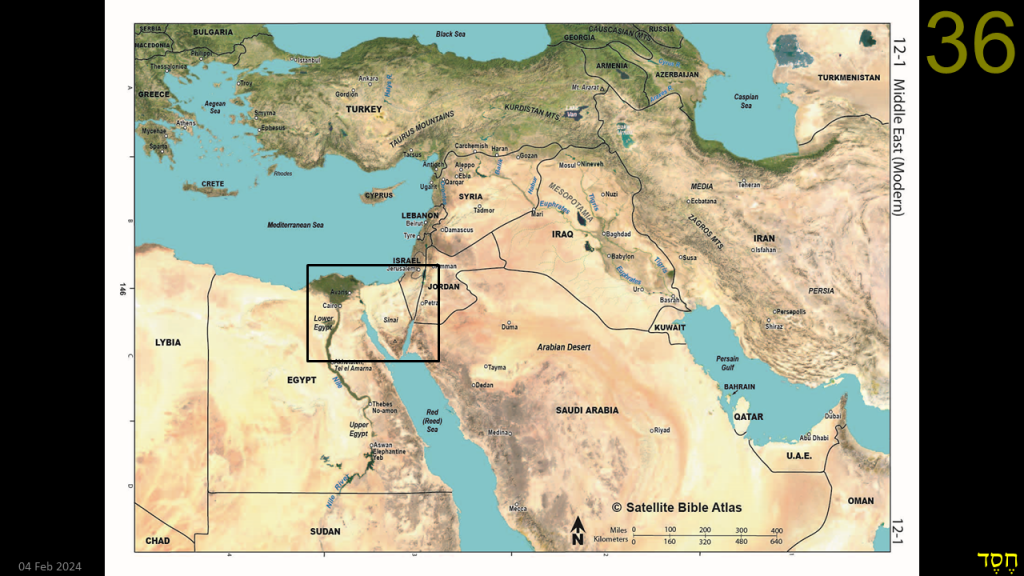
Map of Middle East. The country names and boundaries are today’s countries.
Notice all the yellow regions. These are all desert or wilderness regions, very little water, no one lives there.
The Nile river, like a green snake surrounded by yellow sand.
The Nile flows from south to north (bottom to top of map), ending in the large triangular Nile Delta. A very fertile area, pretty much the only extended patch of green in Egypt.
The superpowers of the ancient world are Egypt in the south, and everyone else in the northern and western part, where we have Turkey, northern Iraq, and northern Iran. This northern/western green region is called the Fertile Crescent.
The northern superpowers are Assyria, Babylon, Persia, Media, Persia, and later, Rome.
Any of the northern armies wanting to fight Egypt must go through Israel. This is why Israel is quite often like a carpet that all the superpowers step through on their way to fight each other.
We’ll look at the area in the black square.
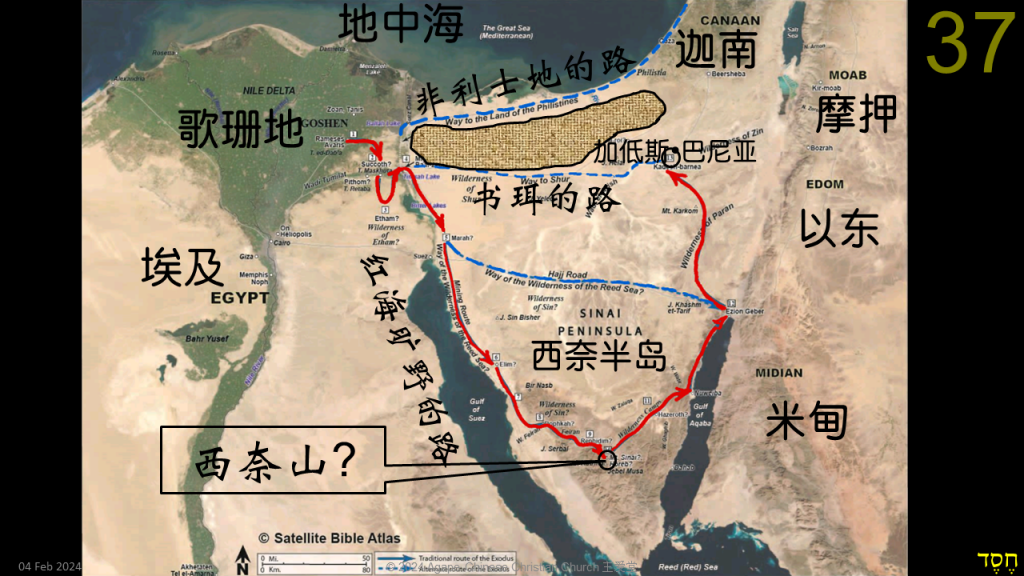
This is a detail of the region of Egypt, the Sinai Peninsula, and the southern part of Israel.
You can see the various possible paths to go from Egypt up north towards Israel:
- The Way to the Land of the Philistines: Goes along the Mediterranean coast. It’s the fastest and most direct way towards the north, and is heavily guarded by Egypt. This is the usual route the Egyptians take when they want to make war with other superpowers.
- The Way to Shur: Just a bit south of the the Way of the Philistines, running parallel to it. There is nothing in between these two routes because it’s all desert.
- The Way of the Wilderness of the Red Sea: This runs south from the Nile Delta, along the west coast of the Sinai Peninsula. This is the route the Egyptians use when they go to mine minerals in the mountainous areas in the middle of the Sinai Peninsula.
- The Hajj Road: A pass that cuts across the middle of the Sinai Peninsula.
These are the only possible paths out of Egypt, because everywhere else is either water or desert.
We are not certain of many of places mentioned in the Exodus journey, so it’s very speculative.
The red path is one possible route of the Exodus. There are many other opinions.
There is Mount Sinai near the bottom of the Sinai Peninsula, but again, we’re not sure. People have suggested several other places for Mount Sinai, so no one knows for sure.

God didn’t take them by the most direct route (The Way of the Land of the Philistines), because they would for sure encounter Egyptian military, followed by the Philistines, then the Canaanites.
Apparently, the Israelites are in no condition to fight. Even after a year or more when they got to Kadesh Barnea, they refused to go into Canaan to fight (the incident with the 12 spies, see Num 14:4).
Lessons
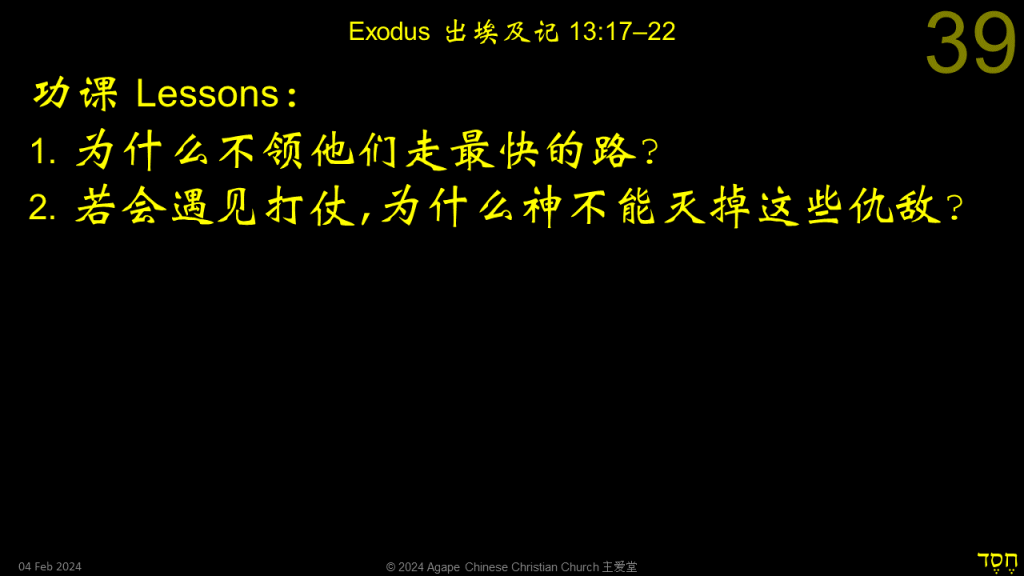
- Why not bring them through the shortest and most direct route?
- If they’re not capable (at least not yet) of fighting, why doesn’t God just fight for them?
They took the long road, and took almost 2 years before getting to the bottom part of the Promised Land.
God wants them to learn:
- Learn who God is.
- Learn how to trust him.
- Learn that everything is under his control, including failures and successes.
- Like Joseph, 13 years before being made 2nd in command of Egypt.
- Like Moses, he spent 40 years in Median as a shepherd (and didn’t even have his own flock) before God called him.
- This is what God wants for us as well: to learn to trust and depend on God, to worship God, to give thanks.
- To learn that success comes from faith in God.
Section 2 红海旷野的路 Way of Wilderness of Red Sea Exo 13:18
Passage
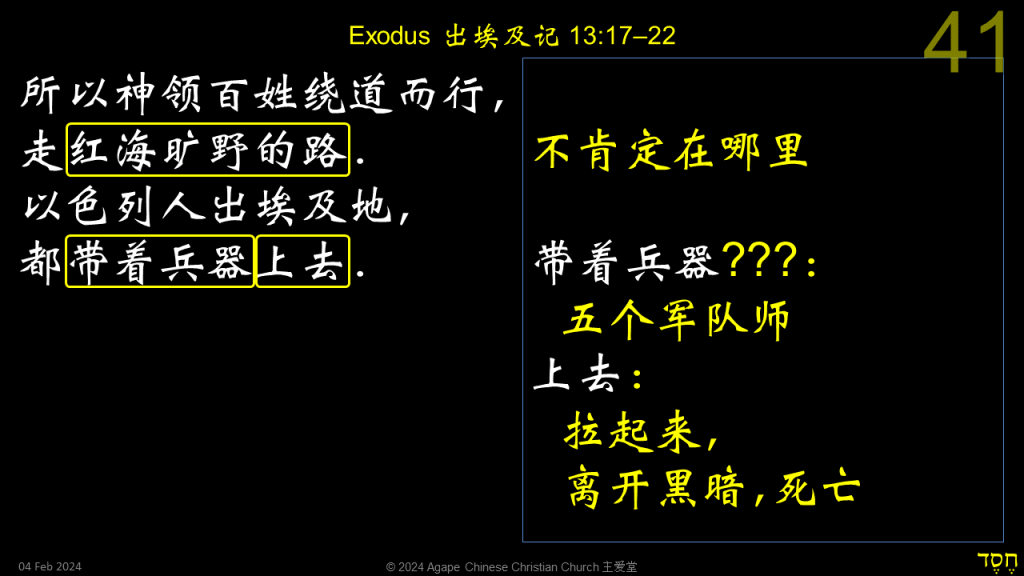
云柱和火柱 Pillar of Cloud and Fire
The featured image is from https://max9210.artstation.com/
Remember these points
I put these points at the top of my sermon-prep template to remind myself every week:
- Show that main point of passage relates to Jesus and his saving work
- (1 Cor 1:18) A truly gospel-centred message will not be acceptable in a synagogue or mosque
- Did I proclaim the gospel as the headline news of the sermon, rather than as a “by the way…”?
- Unbelievers are called to repent, believe, and be saved
- Believers are encouraged to abandon their old self, renew their minds, put on the new self in Christ
- Preach simple sermons, so that God’s people can see Christ more clearly and love him more dearly
News
Chinese new year this Saturday (10 Feb).
Next Sunday we have New Year pot-luck!
Hook

成败得失 Chéngbài déshī Expression meaning success or failure.
成 from 成功 Chénggōng Success
败 from 失败 shībài Failure
得 from 得到 dédào To get something, to obtain something
失 from 失去 shīqù, to lose something

Life’s successes and failures, which provides the best life lessons?
- All of us have occasions of success or failures in life.
- Successes: good mark on an exam, a promotion at work, he/she whom you like is willing to spend time with you, etc.
- Failures: Making a bad decision, losing your job, getting cancer, etc.
- We can learn from both successes and failures, they both provide valuable lessons for our lives.
- Most people would prefer successes in life, but at the same time, most would agree that occasions of failure are what enable us to grow and mature in life.
- The Israelites will learn many lessons as they finally leave Egypt (after 430 years), and most of these lessons are from their failures.
- God took them round the long way into Canaan. Why?
- Maybe to let them learn and mature from hardship and failure.
- Maybe to let them learn to depend on God and not on their apparent successes.
We can all learn the same lessons.
Passage




Outline

Section 1 非利士地的路 Way of the land of Philistines Exo 13:17

Map of Middle East. The country names and boundaries are today’s countries.
Notice all the yellow regions. These are all desert or wilderness regions, very little water, no one lives there.
The Nile river, like a green snake surrounded by yellow sand.
The Nile flows from south to north (bottom to top of map), ending in the large triangular Nile Delta. A very fertile area, pretty much the only extended patch of green in Egypt.
The superpowers of the ancient world are Egypt in the south, and everyone else in the northern and western part, where we have Turkey, northern Iraq, and northern Iran. This northern/western green region is called the Fertile Crescent.
The northern superpowers are Assyria, Babylon, Persia, Media, Persia, and later, Rome.
Any of the northern armies wanting to fight Egypt must go through Israel. This is why Israel is quite often like a carpet that all the superpowers step through on their way to fight each other.
We’ll look at the area in the black square.

This is a detail of the region of Egypt, the Sinai Peninsula, and the southern part of Israel.
You can see the various possible paths to go from Egypt up north towards Israel:
- The Way to the Land of the Philistines: Goes along the Mediterranean coast. It’s the fastest and most direct way towards the north, and is heavily guarded by Egypt. This is the usual route the Egyptians take when they want to make war with other superpowers.
- The Way to Shur: Just a bit south of the the Way of the Philistines, running parallel to it. There is nothing in between these two routes because it’s all desert.
- The Way of the Wilderness of the Red Sea: This runs south from the Nile Delta, along the west coast of the Sinai Peninsula. This is the route the Egyptians use when they go to mine minerals in the mountainous areas in the middle of the Sinai Peninsula.
- The Hajj Road: A pass that cuts across the middle of the Sinai Peninsula.
These are the only possible paths out of Egypt, because everywhere else is either water or desert.
We are not certain of many of places mentioned in the Exodus journey, so it’s very speculative.
The red path is one possible route of the Exodus. There are many other opinions.
There is Mount Sinai near the bottom of the Sinai Peninsula, but again, we’re not sure. People have suggested several other places for Mount Sinai, so no one knows for sure.

God didn’t take them by the most direct route (The Way of the Land of the Philistines), because they would for sure encounter Egyptian military, followed by the Philistines, then the Canaanites.
Apparently, the Israelites are in no condition to fight. Even after a year or more when they got to Kadesh Barnea, they refused to go into Canaan to fight (the incident with the 12 spies, see Num 14:4).
Lessons

- Why not bring them through the shortest and most direct route?
- If they’re not capable (at least not yet) of fighting, why doesn’t God just fight for them?
They took the long road, and took almost 2 years before getting to the bottom part of the Promised Land.
God wants them to learn:
Section 2 红海旷野的路 Way of Wilderness of Red Sea Exo 13:18
Passage

We’re not sure where is “The Way of the Wilderness of the Red Sea.”
In Exo 13:18, it says, “equipped for battle.” This is strange considering we just learned that they’re not ready for battle.
The translation is of a rare Hebrew word, used only 5x in the entire OT.
Better translation would be: “a battalion of five” or something similar.
Notice it said “went up.” This is geographically true (Egypt is below Canaan), but there’s also spiritual meaning:
God is leading them UP from the land of slavery to Pharaoh, UP from death into life, UP from darkness into the light.
Lessons

- Why not lead them through the fastest route? So they can have time to learn
- Learn who God is.
- Learn how to trust him.
- Learn that everything is under his control, including failures and successes.
- Like Joseph, 13 years before being made 2nd in command of Egypt.
- Like Moses, he spent 40 years in Median as a shepherd (and didn’t even have his own flock) before God called him.
- Like Israel served 400 years as Pharaoh’s slaves before being able to leave…
- This is what God wants for us as well:
- To know who God is.
- To learn to trust and depend on God.
- To learn to give thanks.
- To learn to worship God.
- To learn that success comes from faith in God.
Section 3 约瑟的骸骨 Joseph’s bones Exo 13:19
Passage
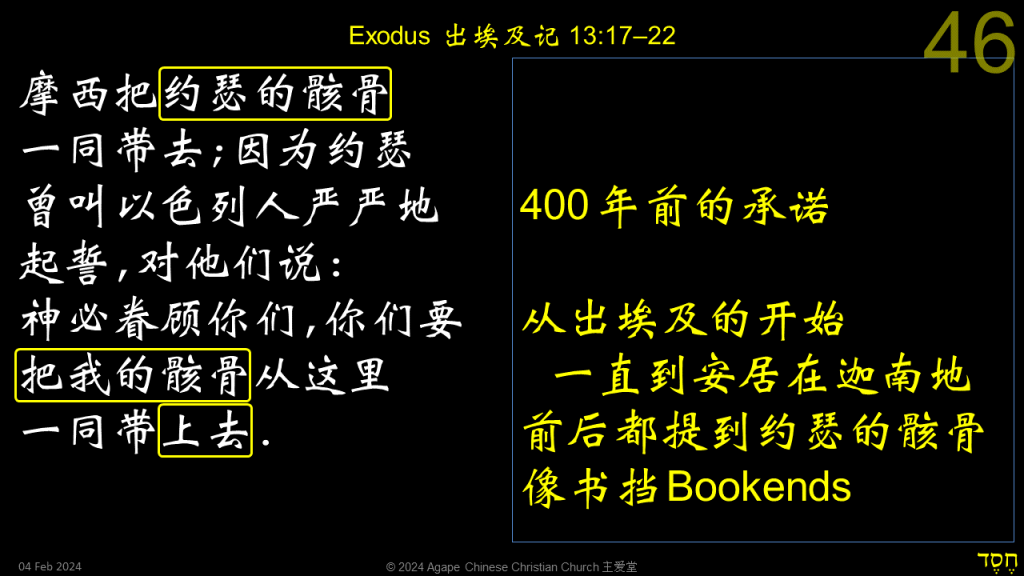
The promise was made to Joseph (by his brothers) over 400 years ago, just before his death.
At the moment when the Israelites leave Egypt (Exo 13:19), it mentioned Joseph’s body.
At the end of their journey, when they settled in the Promised Land, it also mentioned Joseph’s body (Joshua 24:32).
It’s like bookends, bracketing the entire Exodus story.
Again, the bring “up.”
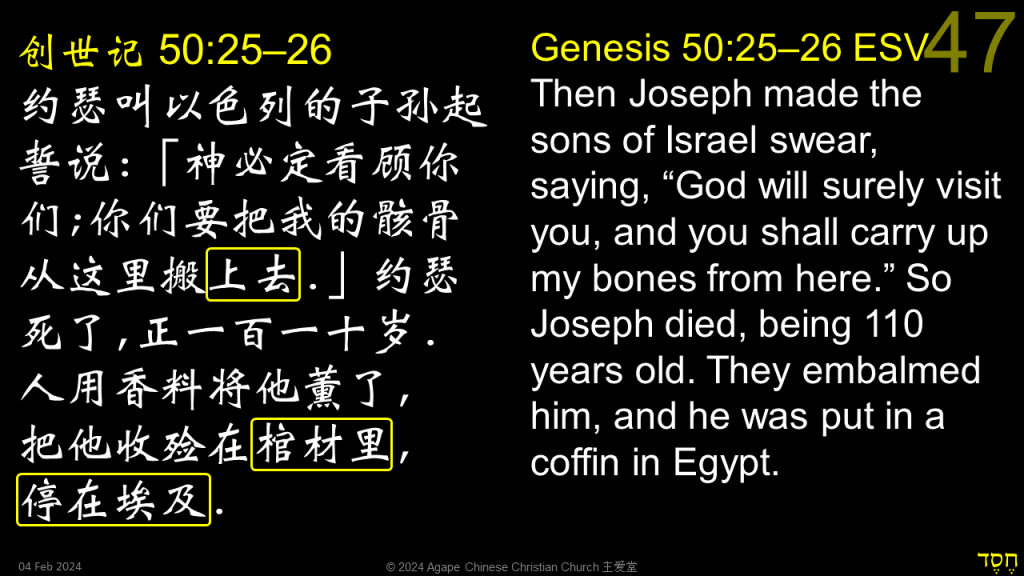
Lessons
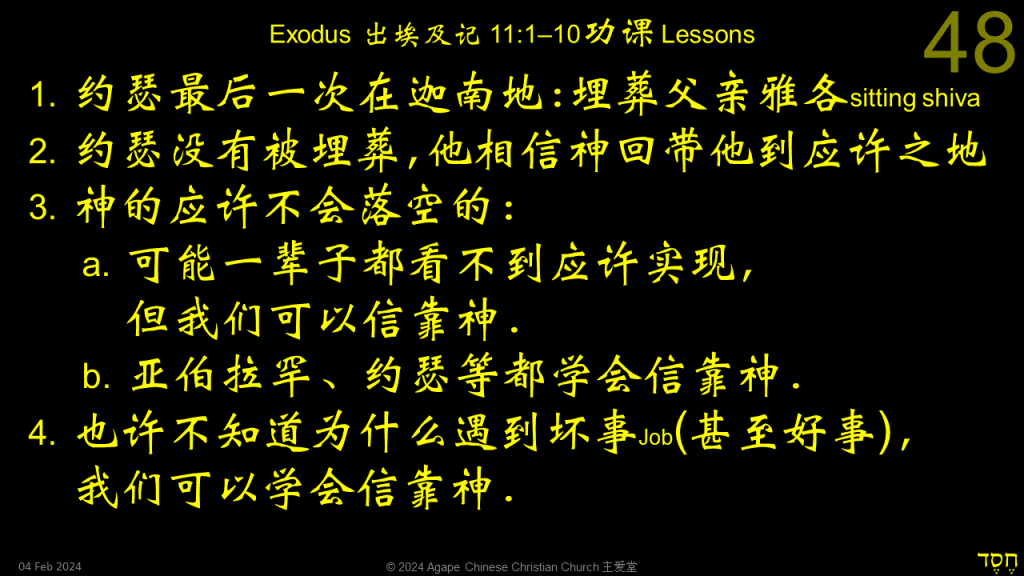
- The last time Joseph was in Canaan was when they buried their father Jacob. Sitting Shiva is the Jewish custom of 7 days of mourning for a dead close-relative (shiva = 7 in Hebrew).
- Joseph didn’t asked to be buried, because he firmly believed God’s promise that they will inherit the Promised Land.
- God’s promises will always be fulfilled:
- We might go through a whole lifetime without seeing the fulfillment, but we must trust in God, because he is faithful.
- Abraham, Joseph, etc., all had this faith (they show up in Hebrews 11, the Hall of Fame of the OT faithful).
- Maybe we won’t know why we’re meeting up with suffering or disaster (like with Job), or even come to success, but we can always trust in God.
Section 4 在以倘安营 Encamp at Etham Exo 13:20
Passage

“Succoth” in Exo 13:20 means tabernacle or tent.
Both of these places are unknown to us now.
But we can trust in God’s word.
Section 5 云柱火柱 Pillar of cloud and fire Exo 13:21 –22
Passage
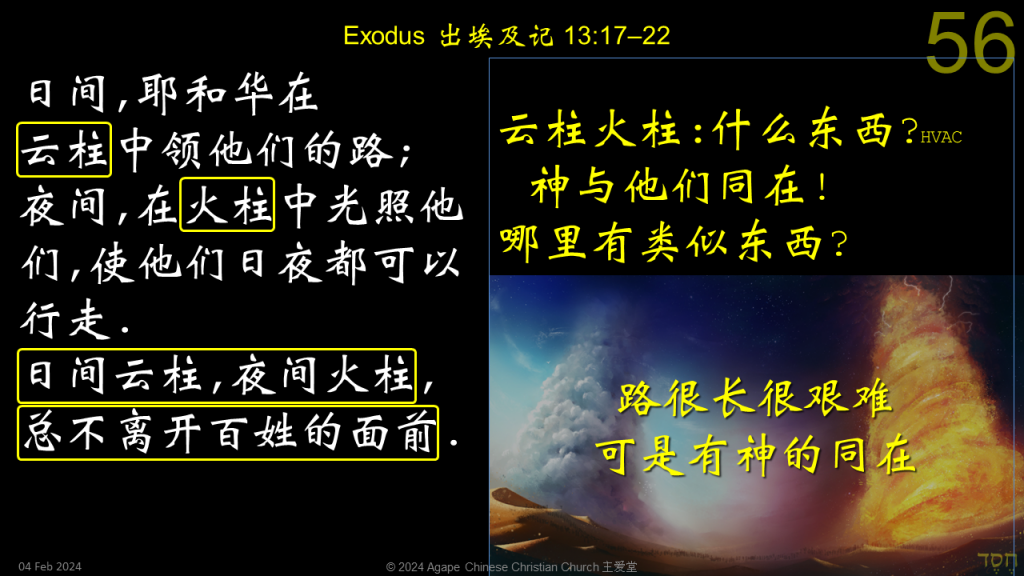
What do you think a pillar of cloud or pillar of fire is?
In a 9Marks BibleTalk podcast, one of the pastors said: “God gave them A/C during the day, and heating during the night!”
The both represent the presence of God.
Where have seen something similar?
In Gen 15, when God made a covenant with Abraham and told him about their 400 years suffering in a foreign land.
In Exo 3, when Moses met God in the burning bush (a bush with fire, but not burnt up).
Notice it said “before the people.” The pillar was in front of them, not behind.
God was leading them, and they were following.
What about us? Do we follow God’s guidance, or are we always in front, telling God what to do?
Lessons
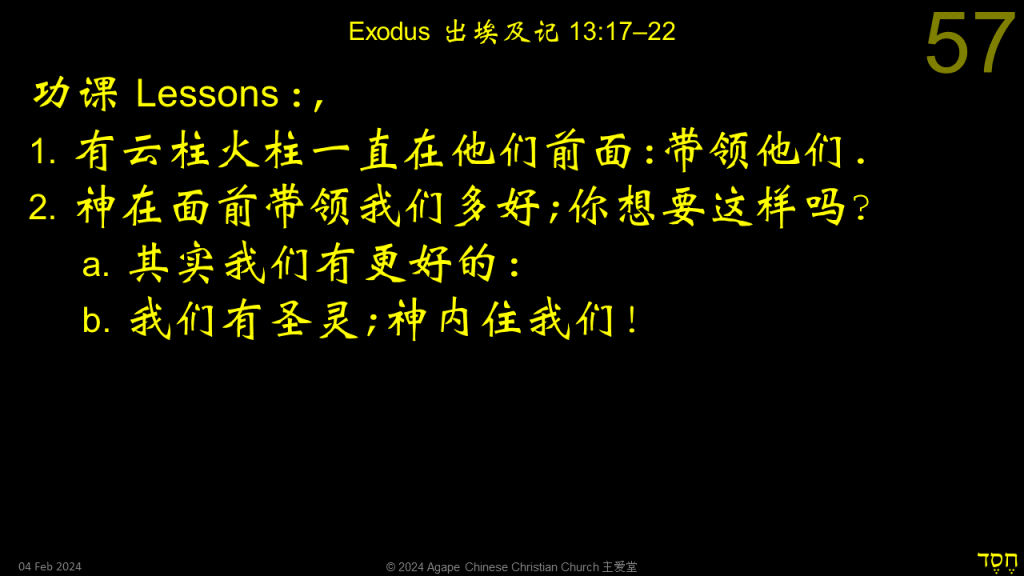
- God is in front leading them, they don’t have to fear.
- Isn’t it great to see God in front of us? Won’t you want that?
- Actually, we have it better!
- We have the Holy Spirit, God himself is living within us!
- Look at a few NT passages
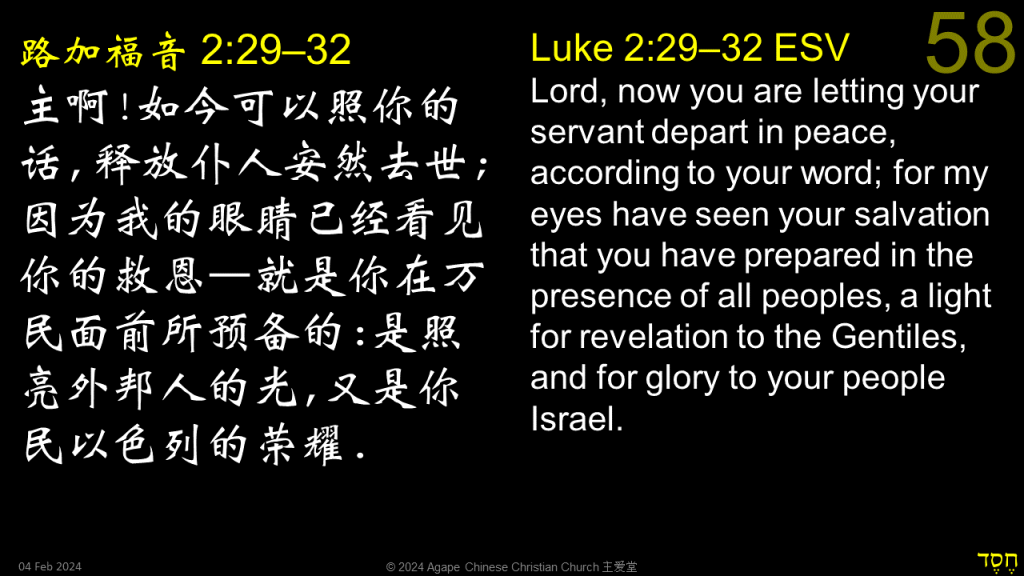
This is the prayer of Simeon, the very old guy to held baby Jesus.
Salvation has arrived (just like for the Israelites), we can have our Exodus from sin and death.
Just like the pillar of fire, Jesus is a light for all people.
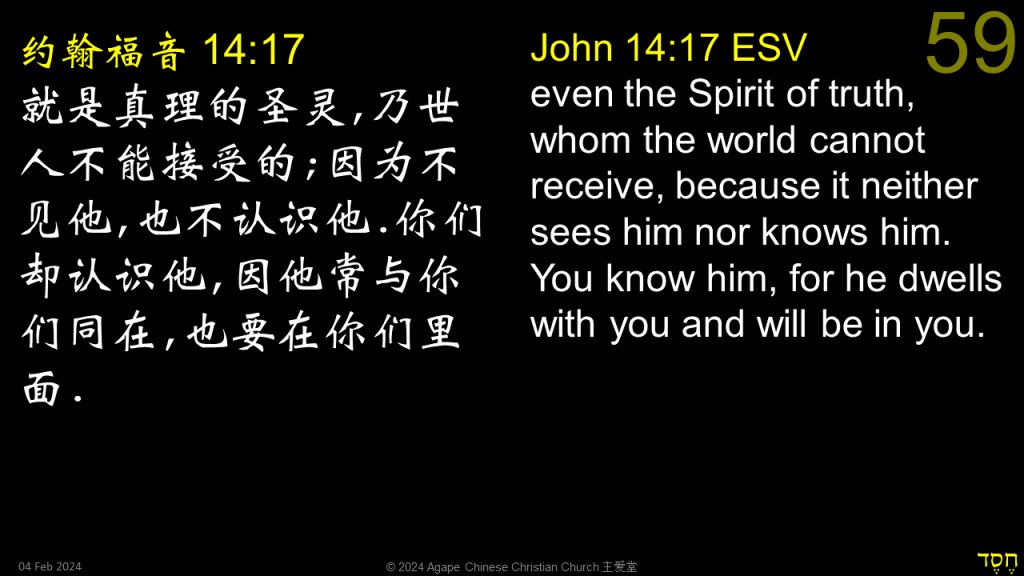
Jesus promised the Spirit of truth (the Holy Spirit) for his disciples (us believers).
The Spirit lives in us.
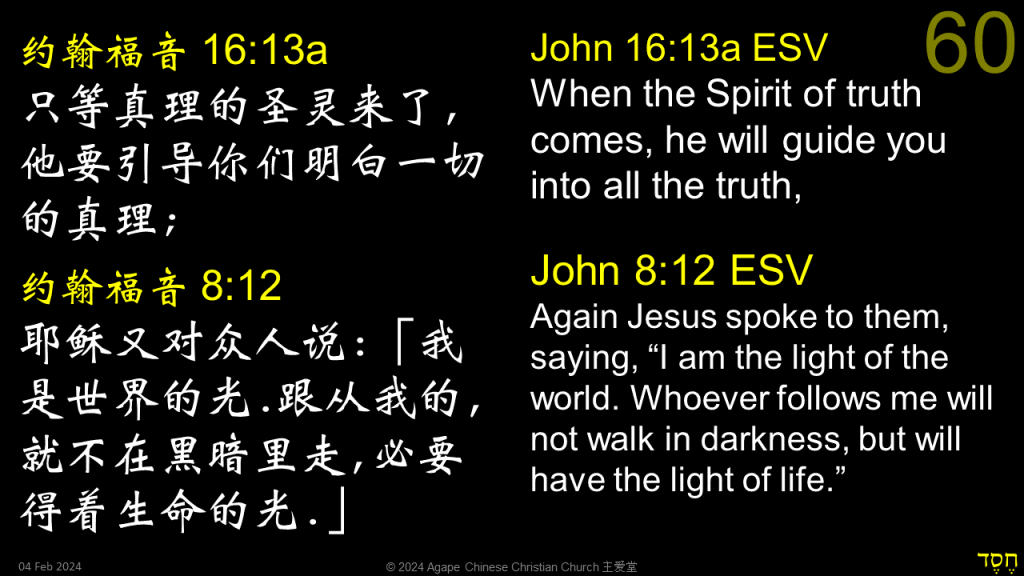
The Holy Spirit will guide us to know God’s word, to know God himself.
Jesus is the light of life, we’re no longer in darkness.

Same thing.
So What?
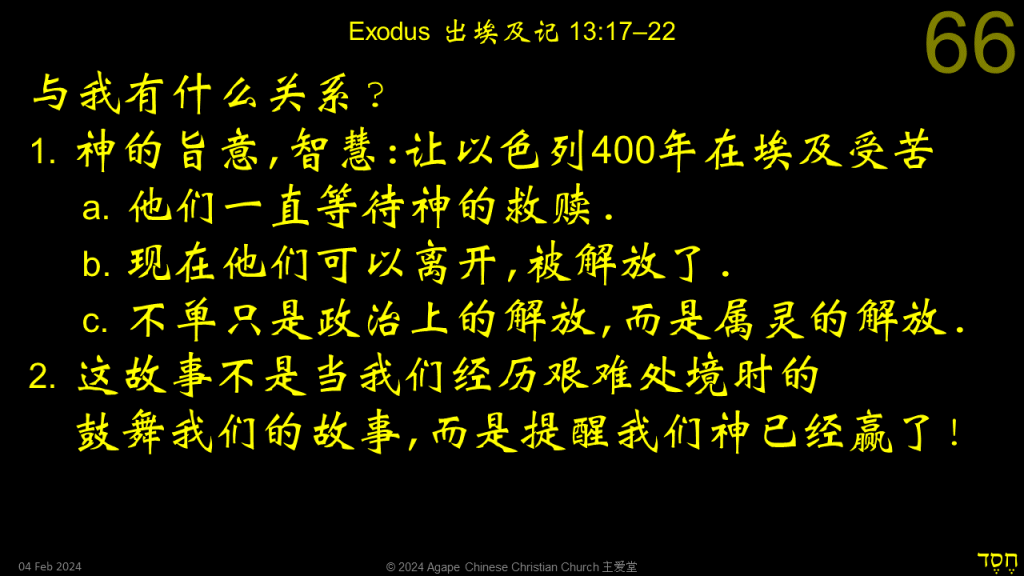
- God’s will, God’s wisdom: They let Israel served as slaves for 400 years in Egypt.
- They were forever waiting for salvation.
- Now they can finally leave, they have been liberated.
- Not just a political liberation (from the clutches of Pharaoh), but it’s also a spiritual liberation.
- This story is not just a pep talk to encourage us when we meet up with difficulties or suffering. Instead, it’s a story to remind us that God has already won!
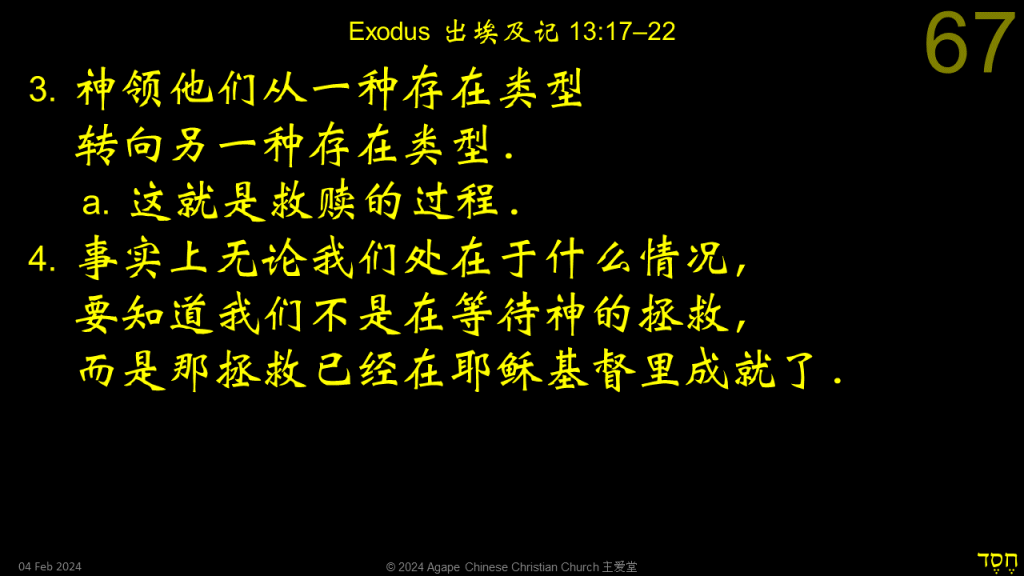
- God is calling his people from one type of existence into another.
- This is the process of salvation.
- In fact, no matter what circumstance we find ourselves in,
we have to know that we’re not actually waiting for salvation,
but this salvation has already been accomplished in Jesus Christ.
When we celebrate Communion, it’s not looking forward to salvation, but remembering that salvation is already accomplished.

